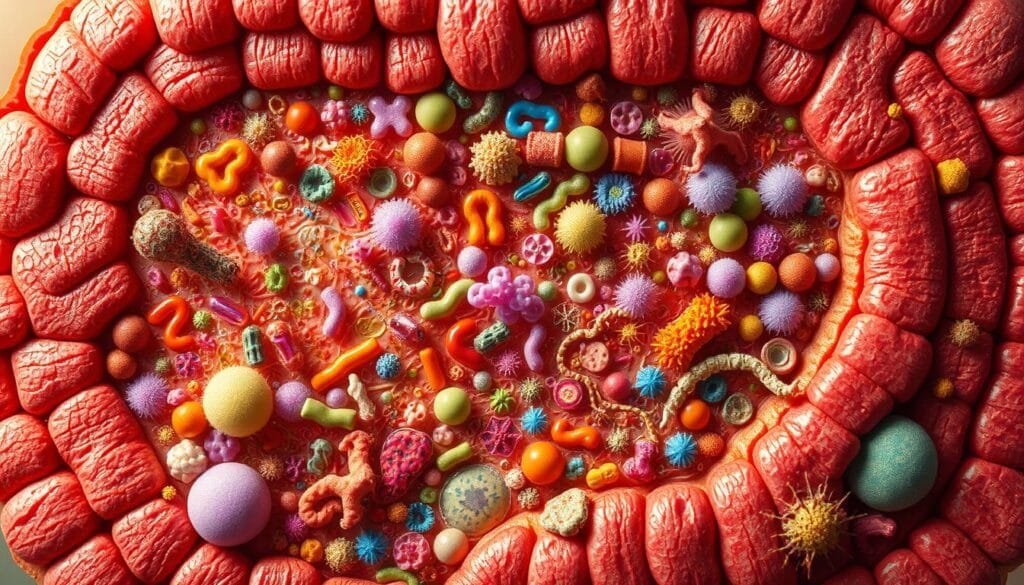Currently Empty: RM0.00
Many people turn to supplements containing live microorganisms to support their gut health. These beneficial bacteria, found in fermented foods like yogurt or kimchi, are celebrated for strengthening immunity and improving digestion. However, some individuals notice mild discomfort, such as bloating, during the first few weeks of use.
This adjustment phase occurs as new bacteria colonize the digestive system. Though temporary, these changes can feel unsettling. Wellness Concept emphasizes that this process often signals the body adapting to a healthier microbiome balance.
For those in Malaysia seeking tailored advice, personalized support is available via WhatsApp at +60123822655. Their team operates Monday–Friday (9:30am–6:30pm) and weekends (10am–5pm).
Key Takeaways
- Initial digestive changes when starting supplements are common but usually brief.
- Bloating or gas often indicates gut bacteria rebalancing.
- Yeast-based options may have different side effects than bacterial strains.
- Professional guidance helps minimize discomfort while maximizing benefits.
- Most users adapt within weeks as their system adjusts.
While side effects are rare, understanding your body’s responses ensures a smoother transition to better health. With proper management, these supplements can become a valuable part of daily wellness routines.
Understanding Probiotics: Benefits and Functions
Trillions of microorganisms naturally reside in the human body, forming a complex ecosystem that influences everything from nutrient absorption to mood regulation. Among these tiny allies, certain strains actively promote wellness by maintaining harmony within the digestive tract.

What Are Probiotics and How Do They Work?
Live beneficial microbes, found in supplements and fermented items like tempeh or kefir, reinforce existing bacterial communities. They function like skilled gardeners—crowding out harmful species while nurturing conditions for beneficial ones to thrive. Specific strains like Lactobacillus acidophilus produce lactic acid, creating an environment less hospitable to pathogens.
The Role of Probiotics in Gut Health
Research shows these microorganisms assist in breaking down food, synthesizing vitamins, and strengthening intestinal barriers. A balanced gut environment supports immune responses and helps regulate inflammation. For example, Bifidobacterium longum may improve bowel regularity, while other strains aid lactose digestion.
Wellness Concept experts note: “Choosing the right strains matters more than quantity. Our team helps clients match products to their unique needs.” Those curious about microbial support can contact specialists at +60123822655 for personalized advice.
Unraveling Side Effects: Common Reactions and Digestive Symptoms
Starting a new wellness regimen often brings questions about how the body might react. Microbial supplements can trigger temporary digestive shifts as your system adapts to new bacterial allies.

Why Adjustments Occur Initially
When introducing live cultures, the gut environment undergoes remodeling. Beneficial microbes release gases like hydrogen and methane as they break down food particles. This activity often leads to mild bloating or irregular bowel movements during the first 14-21 days.
Yeast-based supplements behave differently. Sacchromyces boulardii, for example, may slow digestion temporarily, sometimes causing constipation. Staying hydrated helps ease this transition period.
When to Seek Guidance
Most discomfort fades as the microbiome stabilizes. However, persistent issues beyond 4 weeks could signal imbalances needing attention. Conditions like SIBO share overlapping symptoms—gas, diarrhea, and mental fog—which require professional assessment.
- Typical temporary reactions: Mild cramping, occasional loose stools
- Concerning patterns: Daily discomfort lasting over a month
Wellness Concept specialists advise: “Track your symptoms in a journal. Patterns help us identify whether it’s adaptation or something needing deeper investigation.” Those in Malaysia can message +60123822655 for same-day consultations during operating hours.
Effective Strategies for Probiotics Causing Gas—How to Fix
Adjusting to new wellness routines requires patience and smart strategies. Simple changes in timing, dosage, and diet often make the transition smoother while supporting long-term gut health.
Start Low, Build Slowly
Begin with half the recommended dose for 5-7 days. Gradually increase intake every week. Taking supplements with meals helps reduce bloating, as food buffers their effects. This approach gives your system time to adapt without overwhelm.
Nourish Your Gut Ecosystem
Pair microbial support with fiber-rich foods like bananas or oats. These prebiotics feed beneficial bacteria, improving digestion. Temporarily reduce gas-producing items like beans during adjustment phases. Fermented foods like tempeh can enhance results when introduced carefully.
Track changes in symptoms weekly. Most people notice improvements within 2-3 weeks. If discomfort persists beyond a month, consult a specialist to explore alternative strains or formulations.
Wellness Concept offers tailored plans via WhatsApp (+60123822655). Their team helps Malaysians balance microbial support with lifestyle needs—available daily until 6:30pm weekdays or 5pm weekends.
FAQ
What are probiotics and how do they support the body?
Probiotics are live microorganisms, like Lactobacillus or Bifidobacterium strains, that help balance gut flora. They aid digestion, support immune function, and may improve nutrient absorption. Many people find them in yogurt, kefir, or supplements like Culturelle.
Can taking these supplements lead to digestive discomfort?
Yes, some individuals experience temporary bloating or gas as their gut adjusts to new bacterial strains. Starting with a low dose, such as Renew Life’s 15 Billion CFU, and gradually increasing it can ease this transition.
How long do side effects like bloating typically last?
Mild symptoms often resolve within 1–2 weeks as the body adapts. If issues persist beyond a month, switching to a different strain, like Align’s Bifidobacterium longum, or consulting a healthcare provider is recommended.
What dietary changes can reduce gas when using probiotics?
Pairing supplements with fiber-rich foods like oats or chia seeds may improve digestion. Avoiding processed sugars and carbonated drinks while staying hydrated can also minimize discomfort.
Are there specific strains less likely to cause bloating?
Strains such as Saccharomyces boulardii (found in Florastor) or Lactobacillus rhamnosus GG are gentler on sensitive stomachs. Checking labels for these options might help reduce adverse reactions.
Do fermented foods offer similar benefits without side effects?
Yes, naturally fermented items like kimchi, sauerkraut, or kombucha introduce beneficial bacteria with fewer additives. Incorporating them slowly into meals can support gut health without abrupt changes.


